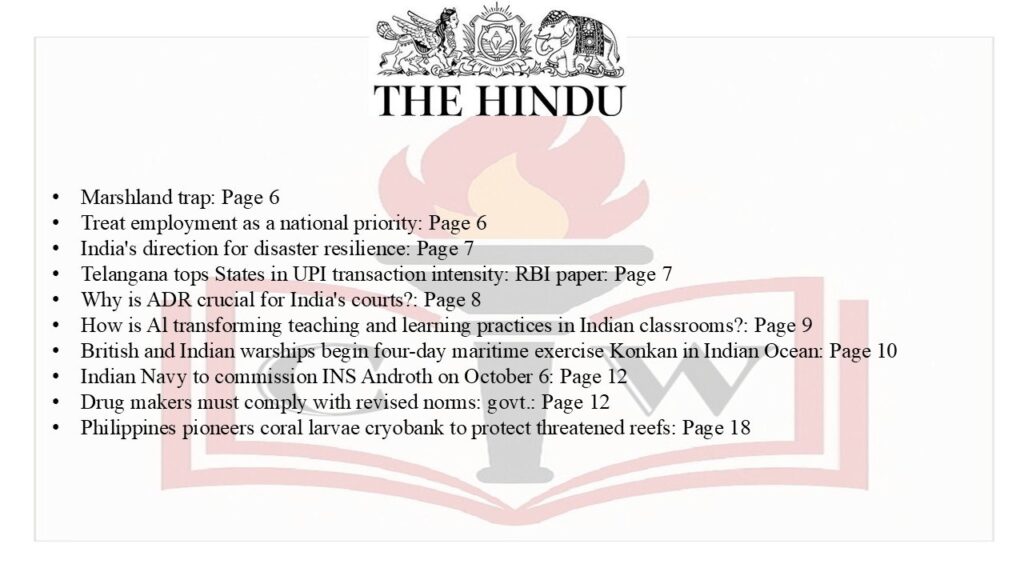Archives (PRELIMS Focus) Nobel Peace Prize 2025 Category: Miscellaneous Context: Venezuela’s Opposition leader María Machado won the Nobel Peace Prize for ‘promoting democracy.’ About Nobel Peace Prize 2025: Awardee: Venezuelan Opposition leader María Corina Machado won the Nobel Peace Prize 2025. Reason for the award: The Nobel Peace Prize 2025 has been awarded to María Corina Machado “for her tireless work promoting democratic rights for the people of Venezuela and for her struggle to achieve a just and peaceful transition from dictatorship to democracy.” Significance: She won the Nobel Peace Prize for her struggle to achieve a democratic transition in the South American nation, winning recognition as a woman “who keeps the flame of democracy burning amid a growing darkness.” About Nobel Peace Prize: Nature: It is one of the five Nobel Prizes established by the will of Swedish industrialist, inventor, and armaments manufacturer Alfred Nobel, along with the prizes in Chemistry, Physics, Physiology or Medicine, and Literature. Background: In 1895, Alfred Nobel’s will specified a prize for those promoting fraternity between nations, reducing standing armies, or supporting peace congresses. Establishment of the award: The Nobel Peace Prize was established in 1901 by Alfred Nobel, and it recognizes individuals or organisations promoting peace, disarmament, and global harmony. Inspiration: Alfred Nobel was inspired by Bertha von Suttner, a peace activist, to include the peace category. Awarding Body: The prize is administered by the Norwegian Nobel Committee, elected by Norway’s Parliament (Stortinget). First recipient: The first Nobel Peace Prize was awarded in 1901 and was shared by two recipients: Swiss humanitarian Jean Henry Dunant and French pacifist Frédéric Passy. Source: The Hindu Census 2027 Category: Polity and Governance Context: A four-day training to conduct the pre-test exercise for the first phase of the Population Census 2027 has started, the Registrar General and Census Commissioner (RG & CCI) said. About Census: Feature: The Indian Census is the largest source of demographic and socio-economic data on the country’s population. First census: India’s first synchronised census occurred in 1881 under W.C. Plowden, the then Census Commissioner of India. Decennial in nature: It has consistently provided detailed statistical information every 10 years, starting in 1872, when the first non-synchronous census was conducted across different regions of India. Legal framework: The Census Act of 1948 was enacted to create a legal framework for census operations and to define the roles of census officers. While the Act provides the legal framework, it does not mandate a specific frequency, making the decennial pattern a convention, not a constitutional requirement. Ministry: In May 1949, the Government of India established a permanent Census organization under the Ministry of Home Affairs to systematize the collection of population and demographic data. Implementing authority: The Office of the Registrar General was later tasked with implementing the Registration of Births and Deaths Act, 1969, further expanding its role in maintaining vital statistics. About Census 2027: The central government has officially notified the conduct of the next decennial census in 2027, exercising its authority under Section 3 of the Census Act, 1948. The Census will have a reference date of 1st March, 2027, for most parts of the country. Source: The Hindu Sawalkote Hydroelectric Project Category: Geography Context: An apex committee of the Environment Ministry has accorded a fresh environmental clearance to the Sawalkote hydroelectric project. About Sawalkote Hydroelectric Project: Location: It is a 1,856 MW run-of-the-river (uses the natural flow of a river with little or no water storage) hydroelectric project located on the Chenab River (a western river under Indus Water Treaty) in Ramban, J&K. Gravity dam: The project was initiated in 1984 and has faced multiple delays over the years. Declared as a project of national importance, it involves the construction of a concrete gravity dam with a reservoir. Electricity production: Once operational, Sawalkote is expected to generate over 7,000 million units of electricity annually, making it one of the largest hydroelectric projects in India. Significance: With the Indus Water Treaty (IWT) in abeyance, the project is considered crucial for harnessing Chenab River’s hydropower potential and enhancing India’s control over western rivers of IWT. About Chenab River: Origin: It is formed by the confluence of two streams, Chandra and Bhaga, in the Lahaul and Spiti Districts of Himachal Pradesh. It is a tributary of the Indus River. In its upper reaches, it is also known as the Chandrabhaga. Course: It flows through Jammu and Kashmir union territory, Himachal Pradesh and after receiving the Jhelum River near Trimmu, the Chenab empties into the Sutlej River. Major Tributaries: Left Bank: Niru, Tawi, Neeru, and Liddrari Right Bank: Ans, Bhut Nalla, Bichleri, Kalnai Marusudar and Miyar Nalla. Major projects on Chenab river: The Chenab River hosts the 390-MW Dulhasti project at Kishtwar, the 890-MW Baglihar project at Ramban, and the 690-MW Salal project at Reasi. These projects significantly contribute to the region’s energy supply. Source: The Hindu Rare Earth Elements Category: Economy Context: US President said that China had sent letters to countries detailing export controls on “each and every element of production having to do with Rare Earths, and virtually anything else they can think of, even if it’s not manufactured in China.” About Rare Earth Elements: Nature: Rare Earth Elements (REEs) are important components in over 200 products, spanning applications in consumer electronics, electric vehicles, defence systems, and many more. Types of Rare Earth Elements: Based on the atomic weight, Rare Earth Elements are divided into two groups – light REEs, those with atomic numbers from 57 to 63 (La, Ce, Pr, Nd, Pm, Sm and Eu) and heavy REEs, those with atomic numbers from 64 to 71 (Gd, Tb, Dy, Ho, Er, Tm, Yb and Lu). Characteristics: REEs are characterised by high density, high melting point, high conductivity and high thermal conductance. Rare Earth Elements share a trivalent charge (+3) and similar ionic radii, hence similar properties. Sources: The principal sources of REE are bastnaesite (a fluorocarbonate which occurs in carbonatites and related igneous rocks), xenotime (yttrium phosphate) commonly found in mineral





